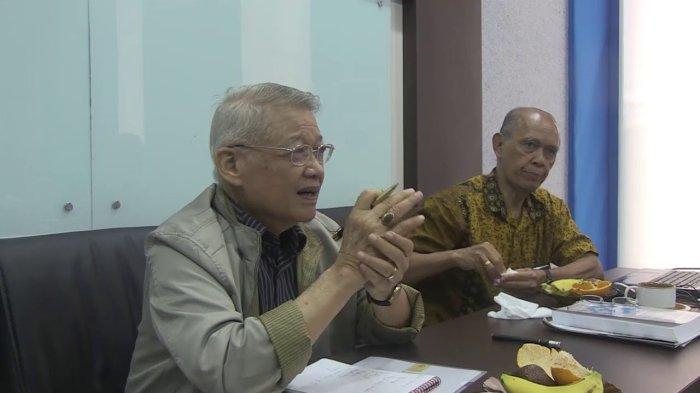Diksia.com - Exploration of the People’s Republic of China (PRC) in Indonesia is now considered much more developed than in the past, especially during the New Order era due to rapidly changing domestic and international dynamics.
The climate of democracy that increasingly developed in the reform era brought freedom to conduct studies of China, commonly referred to as Sinology, which was closely monitored by the government during the New Order.
On the other hand, the beginning of the so-called China’s Rising Era and the increasing ties between Indonesia and China have made the study of Sinology even more necessary.
This opinion was expressed by Professor A. Dahana, Professor Emeritus of Sinology at the University of Indonesia and founder of the Indonesian Sinology Forum (FSI), in a virtual seminar entitled Sinology in Indonesia: History, Development and Challenges in the Present, organized by FSI, Monday 10 July 2023.
In addition to Professor A Dahana, the seminar also presented Prof. Dr. Hermina Sutami, active professor in the China Studies program at the University of Indonesia and led by Muhammad Farid, a China UI study graduate who now teaches at the President University’s Department of International Relations.
In his lecture, Dahana conveyed the history of the origins of the discipline of Sinology. “One of the things we can call the earliest sinologist is Marco Polo, who told the people of Genoa about life in China during the Yuan dynasty when he was imprisoned in that city,” Dahana said.
He said that Marco Polo’s story was later written down in a book by Rustichello entitled The Travels of Marco Polo.
“Later, between the 15th and 18th centuries, missionaries came to China from Europe to preach the gospel,” he continued.
The missionaries also included Jesuits Matteo Ricci and Michele Riggieri, according to Dahana. Both deserve to be called pioneers in the sinology discipline, according to Dahana.
But at that time, according to his explanation, sinology had not yet been separated from religious missionary efforts. It was only at the beginning of the 20th century. The eminent French sinologist Edouard Chavannes lectured on Chinese history at the College de France.
Since then, sinology has gradually developed as an independent science using modern methods. In keeping with the times, the goals of early sinology were culture, ancient history, and the works of the Confucian classics and other philosophical schools in China.
The exploration of China has undergone another development since the founding of the People’s Republic of China and the Cold War between the Western and Eastern Blocs. Sinology, which focuses only on the history, culture, and philosophy of ancient China, is considered less contemporary.
In response, studies have since emerged that deal with contemporary social, economic and political issues in China. In connection with the increasing focus on contemporary topics, the term sinology emerged, which became more popular than the term sinology more than 40 years later.
Regarding Dahana’s explanation, sinology has seen interesting developments in Indonesia as well.
“In Indonesia, the study of China began to develop in the late colonial period, particularly since the first decade of the last century, when an interest in contemporary Chinese problems began to develop, particularly among Chinese.
The emergence of this interest was influenced by political developments in the country, particularly after the names of two prominent political figures emerged, namely Kang Youwei and Dr. Sun Yat-sen,” Dahana said.
According to him, at the end of the first decade of the last century, there was an association in Batavia called Soe Po Sia (Shubaoshe, literally means reading room), which became a meeting place for young ethnic Chinese, who discussed all the developments in China. .
Meanwhile, more or less at the same time, the government of the Dutch East Indies also set up a body called the Kantoor voor Chineesche Zaken (Chinese Affairs Bureau), which served, among other things, to advise the colonial government on how to deal with the Chinese community.
“However, the emergence of Sinology as an academic activity in Indonesia only took place after the end of the Second World War, after two Dutch law graduates, Prof. DR. Van der Valk and Dr. Mister. Meyer founded with the support of Dr. the Sinological Institute. “RP Kramers in 1947,” Dahana said.
“The institution they established aims to educate Chinese members in the tradition of sinology by name,” he explained. The first generation of Indonesian sinologists produced by the above institutions are mostly of Chinese ethnic background, including Ing Djiang, Li Chuan Siu, Tan Lan Hiang and Tan Ngo An.
“Recently, the institution that became the forerunner of the University of Indonesia’s Chinese studies program was strengthened by the arrival of Professor Tjan Tjoe Som, a sinologist who studied at Leiden University and chose to serve in his country , instead of becoming a professor in the Netherlands,” Dahana said.
It was Professor Tjan Tjoe Som and the first generation of Indonesian sinologists who produced the next generation of sinologists, including Professor Gondomono, Dr. Ignatius Wibowo and senior journalist Rene Pattiradjawane,” Dahana concluded.
However, Dahana regrets that, in his opinion, the recent trend along with the era of China’s rise tends to undermine sinology. “Nowadays, there are more and more departments that call themselves Chinese departments or study programs but only focus on teaching Mandarin,” he concluded.
In addition, Dahana expressed concern about the tendency of some observers to lose their critical stance on conducting China studies. “Even though it is important for the Indonesian people to have objective knowledge about China, which is obtained through a critical learning process,” he said.
In agreement with Professor Dahana, Professor Hermina Sutami said that the Chinese study is a scientific activity that studies China/China in a specific area.
While Sinology is a science in a specific field about the state of China. In his view, sinology and sinology are currently facing many challenges. Among others: How to learn Mandarin according to the function of learning a foreign language?
According to Sutami, these functions include being a means of communication with other nations, accelerating the process of Indonesian nation and state building, and utilizing the knowledge and technology of foreign countries whose languages are learned in the face of freedom of competition.
Another challenge is to develop Chinese studies to understand China from different fields of knowledge and build harmonious relations between Indonesia and China.
In addition, the linkages of synology and efforts to establish harmonious relationships between Indonesians of Chinese and non-Chinese descent in Indonesia are also challenges yet to be faced.
In connection with learning Mandarin, Sutami stressed the importance of developing Mandarin teaching methods for Indonesian learners by incorporating local wisdom.
“This is a challenge in itself that should not be ignored,” he said. In his closing statement, FSI Chairman Johanes Herlijanto stressed the importance of equality in Indonesia-China relations.
According to him, one of the ways to achieve equality is to continue to acquire an objective and critical understanding of China. Johanes also encouraged more and more students and educated people in Indonesia to get involved in developing critical studies of China.
“We hope that both Chinese and non-Chinese people will become increasingly interested in studying Chinese Studies, an academic study that makes history, social issues, politics, economics and the behavior of China’s international relations the subject of their studies,” concluded Johanes.






